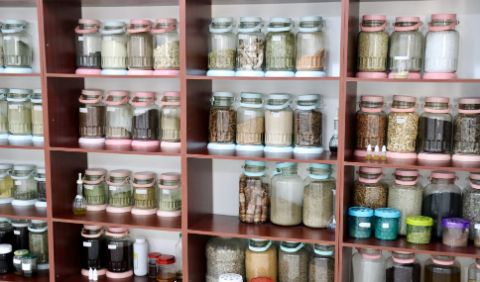Herbal Pharmacy: What We Bring With Us
with Anuscheh Amir-Khalili and Lea Nassim Tajbakhsh
Workshop
Sat., 27.4.2024
10:00–17:00
Location: Heilkräutergarten Hevrîn Xelef, St. Jacobi Friedhof, Hermannstraße 99, 12051 Berlin (next to Prinzessinnengärten)in German
Free entry, please register via participatoryplanet@hkw.de

Herbal pharmacy in Qamishlo, Syria. Photo: Anuscheh Amir-Khalili
The herbal garden Hevrîn Xelef in Berlin—named after the Kurdish building engineer and politician who was murdered in 2019 in Syria—is a place where feminist communities can meet and exchange ideas. Experiences of displacement and war are part of the stories of the women who come here. The engagement with healing herbs and the act of collective gardening make space for issues such as trauma, grief, and healing. Connections between humans, plants, and the environment are fostered.
The workshop draws on this approach of the garden: it is accessible to all and takes up the connection between soil and humans. The participants collectively gather ideas on how an open access to knowledge on medical herbs and healing processes can be organized. The effects of plants are brought together with questions of social justice. The cultivation of plants serves as a point of departure for an exchange on the impacts of displacement and migration for individuals and communities. Thus, a perspective of collective healing is developed through plants as well as the knowledge of women who have experienced displacement. Furthermore, the idea of open herbal pharmacies is discussed. What would a pharmacy in the midst of a herbal garden look like in which marginalized people have access to teas, tinctures, and salves?
The workshop is held by the anthropologist Anuscheh Amir-Khalili (Flamingo e.V, anstiftung), who is a mentor of the Growing phase of A Participatory Planet. The herbalist Lea Nassim Tajbakhsh will give an excursus on special wild plants and herbs.